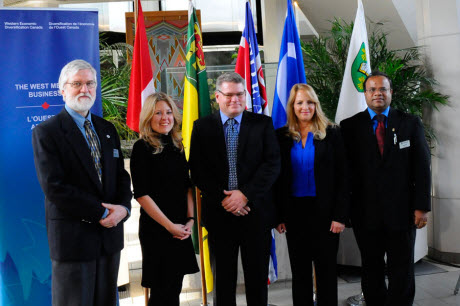Big Boost to Green Fuel
Biofuel producers in Western Canada will soon be able to purify and convert raw glycerol more cost-effectively thanks to an investment of $538,542, announced recently by the Honourable Michelle Rempel, Minister of State for Western Economic Diversification.
 Pictured left to right: Jim Basinger, Associate Vice-President research, U of S, Michelle Rempel, Minister of State for Western Economic Diversification, Randy Hoback, Member of Parliament for Prince Albert, Janice Tranberg, Executive Director, SaskCanola, and Ajay Dalai, Canada Research Chair in Bioenergy and Environmentally Friendly Chemical Processing.University of SaskatchewanWith this funding, researchers at the University of Saskatchewan (U of S), led by Canada Research Chair in Bioenergy and Environmentally Friendly Chemical Processing and Professor of Chemical Engineering, Ajay Dalai, will be able to purchase highly-specialized equipment for the development and commercialization of new, more efficient and affordable glycerol purification and conversion technologies.
Pictured left to right: Jim Basinger, Associate Vice-President research, U of S, Michelle Rempel, Minister of State for Western Economic Diversification, Randy Hoback, Member of Parliament for Prince Albert, Janice Tranberg, Executive Director, SaskCanola, and Ajay Dalai, Canada Research Chair in Bioenergy and Environmentally Friendly Chemical Processing.University of SaskatchewanWith this funding, researchers at the University of Saskatchewan (U of S), led by Canada Research Chair in Bioenergy and Environmentally Friendly Chemical Processing and Professor of Chemical Engineering, Ajay Dalai, will be able to purchase highly-specialized equipment for the development and commercialization of new, more efficient and affordable glycerol purification and conversion technologies.
Glycerol, a by-product of processing canola into biodiesel, must be separated from biodiesel as it does not burn effectively. While raw glycerol has limited commercial value, the U of S’ purification technology could double the price that companies can charge for the substance, in turn adding more value to biodiesel production.
“Our Government is pleased to support this collaborative project between industry and University of Saskatchewan,” said The Honourable Michelle Rempel, Minister of State for Western Economic Diversification. “Providing innovative technologies that will help increase the productivity and competitiveness of the biofuel and biochemical sectors in Western Canada.”
“This major investment in biofuels-related research builds on an area of outstanding U of S research strength, developing new cutting-edge technologies that will benefit biofuel producers and our economy, said Karen Chad, vice-president research, University of Saskatchewan. “It’s an excellent example of how we work with industrial and government partners to help find clean energy solutions that can lead to spin-off companies and new job opportunities.”
The U of S plans to develop and file three patents: one for the purification technology, and two for the conversion technologies. A Saskatchewan start-up company is expected to manufacture all three technologies for commercial use, and subsequently market them.
